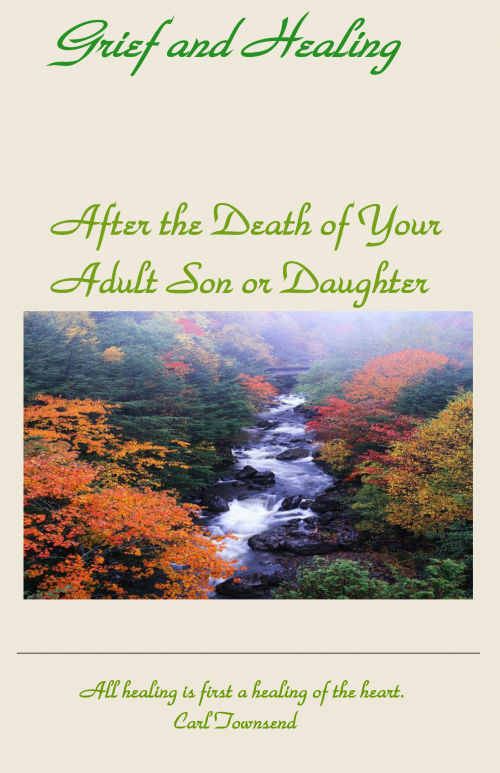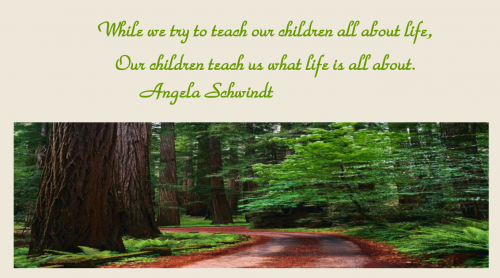

The death of one’s child is the loss parents fear yet never expect to face. Parents of all ages who lose children of any age often feel it is simply unnatural for the parent to outlive the child. Our children fill our lives. When they are gone, the emptiness is palpable. When they came into the world, a door was opened, one you didn’t think you would ever have to close. Yet here you are trying to go forward into territory you didn’t want to travel without your child.
When your adult son or daughter dies, you lose one of your main friends and sources of support and love. You may have lost one who has been critical to your well-being, providing financial or practical assistance you will have trouble getting along without. There is part of the parental “contract” that leaves bereaved parents with a sense of responsibility or failure when a child dies at any age. It feels like you should have been able to do something more to protect your child, more to prevent this sad outcome. “A mother’s work is never done” is more than a proverb about household chores! Even when an adult child is fully independent and doing well, a parent feels more than a passing interest in and accountability for that person’s welfare.
Parents may be seen as more experienced in life’s hardships, better equipped to deal with their loss. They may feel they are needed to support spouses, children and siblings of the one who has died. All of this may be true. Yet who cares for the parent when the emotions are overwhelming, when the loss darkens the days and the loneliness hurts to the bone?
What does a parent do in this situation? A unique aspect of the death of one’s child is the belief that this life has been incomplete. It was supposed to go on long after the parent died and that didn’t happen. So a parent is likely to become absorbed in thinking about the son or daughter’s life, telling the story, reviewing details in light of the outcome, imaging how it could have been had it continued longer. After all, you are the person who imagined this life in the first place, you formed dreams and hopes and goals, you nurtured this person from beginning to end the best you could. Now the story is altered and you want to remember, validate and honor the whole life of your child.
In our “get on with it” culture, few may understand, appreciate or have patience with your desire to dwell on the life of your deceased child. Others may try to cope by not talking about your child as their way of not hurting so badly. You may encounter pressure after some months have passed to stop ruminating, talking about your child and your sorrow or even crying. Yet it is precisely in remembering, thinking, talking and crying one’s way through a natural experience of grief that people receive healing, gain a sense of completion and coherence about the lives of their children and are freed to go on with their lives.

There’s a kind of helplessness that may come with grief. You are facing a problem without a solution. Someone you love has died and there’s no way to undo that circumstance. Many people look forward to a spiritual reunion or feel an ongoing spiritual connection and that is important. It is not the same as sharing life, day to day, with a living, flesh-and-blood person. In that helplessness lies the inclination to endure grief silently and alone, acting like it doesn’t hurt or like you’re handling it better than you are. Eventually you may become used to the feelings of loss, or numb to them, and think that time has healed you. Sadly, people end up carrying around great weights of accumulated sadness that they thought was behind them just because time had passed. That baggage can result in weariness, a lack of enthusiasm or hope, emotional and relationship problems, even physical health problems.
Where can you find the support you need to get through this time? The love of family and friends is essential. Sometimes those closest to each other learn there is a limit to their ability to support one another in some of grief’s pathways. Sensitivity to others’ feelings, a desire to avoid adding to others’ burdens and other barriers can get in the way of deep and open sharing. Someone who can listen calmly and reassure you without offering advice or guidance can be helpful to you. Usually this will be a person outside the circle of those who share the loss. Perhaps a friend or spiritual leader, a counselor or therapist can support you. Groups of people meet together to provide this objective and empathetic support to one another. Reaching out in some way usually helps. The alternatives are enduring repeated disappointment in those hoped would help you or withdrawing into a self-protective isolation.
Many parents find ways to honor their children through memorials, foundations, funds, contributions to community programs and efforts. There are endless possibilities for continuing your son or daughter’s story into the future.

Here are a few ideas that have proven helpful to many grieving people.
*Use your resources. Reach out for support from family, friends, members of your faith community - anyone who is part of your network of relationships. If you have established patterns, routines or rituals of spiritual, emotional and physical health, use them to deal with the current state of your life. Praying, journaling, working out and other activities can be valuable aids to both endurance and healing when you are grieving.
*Find new resources. There are all kinds of printed materials to provide information, inspiration and direction that can help grieving people. Ask around, visit a bookstore or library, go online. Look for titles and descriptions that you relate to. There are many grief-related connections online, including websites, articles, chats and blogs, as well as links to local support providers.
*Seek community or professional support. Hospices, funeral homes, religious communities and other organizations provide support groups, informational meetings, classes and counseling for grievers. Grief counselors, mental health therapists, spiritual leaders, chaplains and others can provide individual help as you work through your grief experiences.


